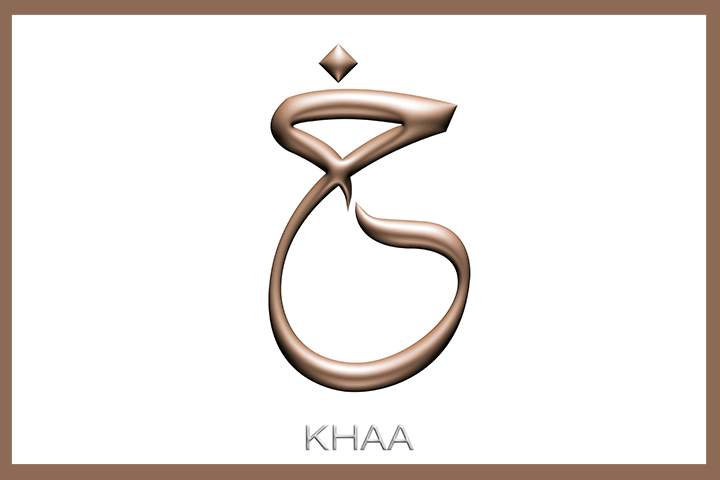Ready to discover one of the most unique letters in the Arabic alphabet? It’s the letter خ (known in English as khaa). This is the seventh letter of the Arabic alphabet, and its sound might seem difficult at first, but it’s actually fun and easy to master.
This article is your complete guide to the arabic letter kha words, covering everything from pronunciation and writing to its use in words and sentences.
The Sound of Khaa (خ): The Secret to the Unique Guttural Sound
The sound of the letter خ doesn’t have a direct equivalent in English. It’s similar to the “ch” sound in the German word “Bach” or the “j” in the Spanish word “jalapeño.” It’s a guttural, throaty sound that comes from the back of your throat.
- Tip for learners: To pronounce kh correctly, try starting with the sound of the letter ح (Haa), which is a soft exhale sound. Then, tighten your throat muscles slightly and add a rougher, scratchy sound, almost like you’re clearing your throat. The resulting sound is kh.
The Four Forms of the Letter Khaa
The letter خ is a connecting letter, which means its shape changes depending on its position within a word. It has four main forms:
- Isolated: خ
- Example: صاروخ (ṣārūkh – rocket)
- Initial (at the beginning of a word): خـ
- Example: خروف (kharūf – sheep)
- Medial (in the middle of a word): ـخـ
- Example: مطبخ (maṭbakh – kitchen)
- Final (at the end of a word): ـخ
- Example: بطيخ (baṭṭīkh – watermelon)
The Letter Khaa with Vowels
The sound of the letter خ changes slightly depending on the short or long vowel that comes with it.
| Short Vowels | Transliteration | Example Word |
|---|---|---|
| خَ (fatha) | kha | خَبَر (khabar – news) |
| خُ (damma) | khu | خُبْز (khubz – bread) |
| خِ (kasra) | khi | خِدْمَة (khidma – service) |
| خْ (sukūn) | kh | مَخْبَز (makhbaz – bakery) |
| Long Vowels | Transliteration | Example Word |
|---|---|---|
| خا (alif) | khaa | خاتِم (khaatim – ring) |
| خو (waaw) | kho | خوف (khoof – fear) |
| خي (yaaʾ) | khe | خيار (kheyaar – cucumber) |
Common Arabic Words with خ (and How to Use Them)
To help you master these arabic letter kha words, here are some common examples and how they’re used in simple sentences:
- خَرُوف (kharūf) – sheep
- The shepherd was leading his sheep to the pasture.
- كان الراعي يقود خروفه إلى المرعى.
- مَطْبَخ (maṭbakh) – kitchen
- My mother prepares food in the kitchen.
- أمي تعد الطعام في المطبخ.
- بَطِّيخ (baṭṭīkh) – watermelon
- I love to eat watermelon in the summer.
- أحب أن آكل البطيخ في الصيف.
- خَرِيف (kharīf) – autumn
- The leaves fall in autumn.
- تتساقط الأوراق في فصل الخريف.
- أَخ (akh) – brother
- This is my older brother.
- هذا أخي الأكبر.
Common Mistakes to Avoid
Beginners often make a few mistakes when pronouncing the letter خ. The most common ones are:
- Confusing خ with ح: Some learners mix up the two sounds. Remember that the خ sound is rough and comes from the back of the throat, while the ح sound is soft and breathy, coming from the middle of the throat.
- Confusing خ with غ: The sound of the letter غ (ghayn) is similar to خ but is pronounced with a vibration in the vocal cords, whereas خ is voiceless and has no vibration.
Extra Facts About the Letter Khaa
To give your learning a boost, here are a few more fascinating details about the letter khaa and its place in Arabic culture and language.
- Historical Origin: The letter خ is one of six letters that were added to the original Arabic alphabet. It is derived from the letter ح, and in the past, when dots weren’t used, both خ and ح were written exactly the same!
- Famous Names: Many well-known Arabic words with خ are names, such as Khalid (خالد) and the name of Prophet Muhammad’s first wife, Khadija (خديجة).
Conclusion
Mastering the letter khaa is a key milestone in your Arabic learning journey. From its unique guttural sound to its four distinct forms in arabic words with خ, you now have the tools to pronounce and use this special letter with confidence. Remember that practice is your best friend. Keep listening to native speakers, repeating the arabic letter kha words you’ve learned, and soon you’ll find that this once-challenging sound becomes one of your favorites.
If you wish to learn more about the Arabic language, download our Arabic learning app.



